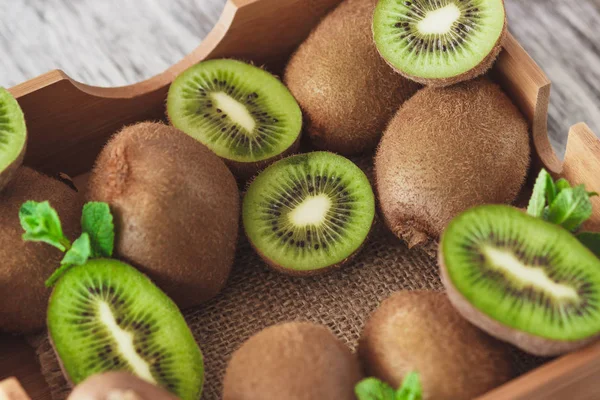Can kiwifruit boost your mood when you are low? Recent research published in The British Journal of Nutrition has shown that kiwifruit can be a powerful mood booster, improving vitality and mood in as little as four days.
The study involved 155 adults with low vitamin C levels who were given daily either a vitamin C supplement, placebo, or two kiwifruits. One group received two kiwifruits per day, another took a vitamin C supplement, and the third received a placebo.
The participants tracked and reported their vitality, mood, flourishing, sleep quality, sleep quantity, and physical activity using smartphone surveys.
The researchers found that kiwifruit supplementation improved vitality and mood within four days, peaking around 14-16 days, and improved flourishing from day 14.
Vitamin C, on the other hand, marginally improved mood until day 12.
The study suggests that consuming whole foods like kiwifruit may have synergistic effects on mental well-being.
Co-author Professor Tamlin Conner, of the Department of Psychology at the University of Otago, said, “It’s great for people to know that small changes in their diet, like adding kiwifruit, could make a difference in how they feel every day”.
The researchers believe that these changes in mood may be partly due to the fruit’s high vitamin C content.
The impressive results
Kiwifruit group: Those who ate kiwifruit daily reported significant improvements in vitality and mood within just four days! These positive effects peaked around days 14-16 and continued throughout the study.
Vitamin C group: Interestingly, the vitamin C supplement group only showed marginal improvements in mood, and these effects faded by day 12.
Placebo group: The placebo group experienced no significant changes in mood or vitality.
These findings suggest that kiwifruit offers something beyond just vitamin C when it comes to boosting mood and energy. Researchers believe the synergistic effects of various nutrients and bioactive compounds in kiwifruit may play a role. Some potential contributors include:
- High vitamin C content: Vitamin C is essential for neurotransmitter production and brain function, and kiwifruit is an excellent source of this important nutrient.
- Fiber: Kiwifruit is a good source of fiber, which promotes gut health and may indirectly influence mood through the gut-brain axis.
- Antioxidants: Kiwifruit is rich in antioxidants, which protect cells from damage and may reduce inflammation, potentially improving mood and overall well-being.
- Sleep quality: Some studies suggest kiwifruit may improve sleep quality, which can directly impact mood and energy levels.
While more research is needed to fully understand the mechanisms behind kiwifruit’s mood-boosting effects, the current evidence is promising. So, if you’re looking for a natural way to improve your mood and vitality, adding a couple of kiwifruits to your daily diet is a simple and delicious option. Here are some tips for enjoying kiwifruit:
- Eat them fresh as a snack or add them to yogurt, smoothies, or fruit salads.
- Use them in baking, such as muffins or cakes.
- Try them roasted or grilled for a unique flavor.
How much kiwifruit should be consumed to improve mood?
According to the research, eating two kiwifruits a day can improve mood and give extra energy.
The study found that kiwifruit supplementation improved vitality and mood within four days, peaking around 14-16 days, and improved flourishing from day 14.
The researchers believe that these changes in mood may be partly due to the fruit’s high vitamin C content.
The study suggests that consuming whole foods like kiwifruit may have synergistic effects on mental well-being.
Therefore, to improve mood, it is recommended to consume two kiwifruits a day.
Limitations to consider:
- Most studies on kiwifruit and mood have been small-scale and short-term, so more research is needed to confirm the long-term effects.
- Individual experiences can vary, and what works for one person might not work for another.
- If you’re experiencing persistent low mood or depression, it’s crucial to seek professional help from a therapist or healthcare provider.
Side effects of consuming kiwifruit
Consuming kiwifruit can have side effects, especially if consumed in large quantities. Some of the common side effects of kiwifruit include allergic reactions, such as trouble swallowing, vomiting, and hives in people who are allergic to the fruit.
Overconsumption of kiwis may cause allergic reactions, rashes, swelling, oral allergy syndrome (OAS), dermatitis, pancreatitis, and diarrhea.
Kiwi might slow blood clotting in some people, which can increase the risk of bleeding during surgical procedures. Kiwi can also lead to synergistic effects on the levels of serotonin and make bleeding disorders worse. Overeating of kiwifruit can cause acute pancreatitis, vomiting, nausea, and diarrhea. However, kiwifruit is safe for pregnant and breastfeeding women when taken in food amounts. It is recommended to consume kiwifruit in moderation to avoid any side effects.
ALSO READ: Vegans may have lower birth weight babies and higher risk of preeclampsia during pregnancy
Reference
Fletcher BD , Haszard JJ, Vissers MCM , Conner TS. Smartphone survey data reveal the timecourse of changes in mood outcomes following vitamin C or kiwifruit intervention in adults with low vitamin C. British Journal of Nutrition. 2023 Dec 11:1-13. doi: 10.1017/S0007114523002787.










